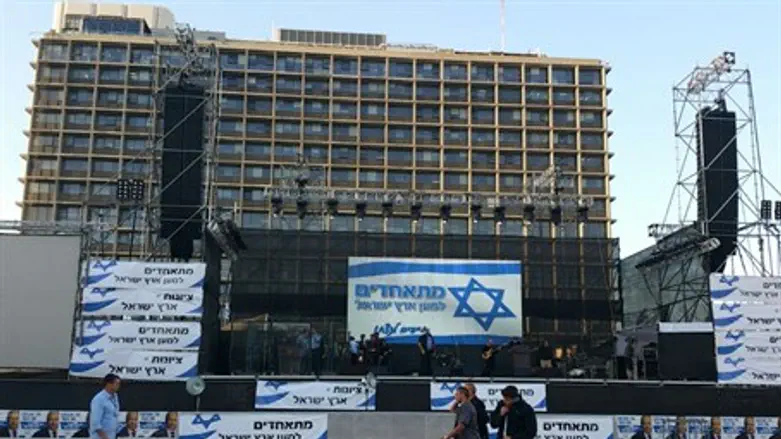
In his second controversial decision of the day, Central Elections Committee Salim Jubran late Sunday banned appearances by musical artists at the huge right-wing rally in Rabin Square in Tel Aviv taking place Sunday evening. Among the artists that were to appear at the event were Amir Benayoun and Avi Davidi, but their performances were canceled by rally organizers.
Jubran wrote in his decision on the matter that his aim was to “prevent unfair influence that the performances might provide to voters. It does not appear that the organizers were able to successfully divide between the political content of the event and its entertainment component, in order to reduce the strong synthesis between the two. As such, it appears that the proposed schedule would be propaganda accompanied by music.”
Music and performances by the artists are thus banned “before, during, and after the planned rally in Rabin Square,” Jubran wrote.
At the rally held by left-wing groups last Saturday night, there were numerous musical groups, poets, and cultural personalities appearing throughout the event. At least one of those artists – Yair Garbuz – made extremely controversial, and political, comments about Israeli voters. “They want us to believe that the murderer of the Prime Minister came from a small, insignificant group of lunatics,” he told the crowd, many of whom had been bused in from kibbutzim around the country. “They told us that the yellow-shirted black-symboled 'Kahane was right' crowd that shouts 'death to the Arabs' was a small gang. That the 'price tag' people who attack Arabs are a minuscule minority. That violence was 'negligible' among these groups.
"They said that the racists were not representative of Israeli society, that the thieves and bribe-takers were a small group, that those who kiss the 'lucky charms' and bow down at the graves of the dead (a reference to haredi and religious Jews who visit the tombs of dead rabbis – ed.) were a small group. That the rapists and sexual harassers were a small group. That the corrupt police did not represent the majority,” Garbuz said. “So how is it that this 'minuscule minority is ruling the country?,” he said, referring to the current Likud government and its partners. “How did this minority become the majority? How did this troublesome gang become so widespread? How is this group digging below us the worst of all tunnels, the tunnels of ignorance? How are they building a tunnel of hate under us?,” Garbuz added, to the loud cheers of the crowd.
Earlier Sunday, Jubran forced the Yachad party to remove from its campaign commercial broadcasts a video filmed in south Tel Aviv that shows frightened and angry residents praising Eli Yishai for standing up to the illegal African migrants whom they claim have made their lives impossible.
Jubran banned the video on the grounds that it “almost definitely” crosses the line “into racism and incitement of violence.” Jubran said that the video mentions that Yishai will “put an end” to the phenomenon, although he agreed with Yishai's attorney that expression did not necessarily have racist or genocidal implications. At issue was the phrase used in the video “Yishai will put an end to illegal immigrants,” but the phrase “put an end” (“ketz”) is a word same Hebrew letters (kuf and tzaddik) that Yahad is using as its ballot symbol. Thus, he admitted, the phrase could be seen as just a clever play on the party's symbol – but still, Jubran said, he felt it went too far.